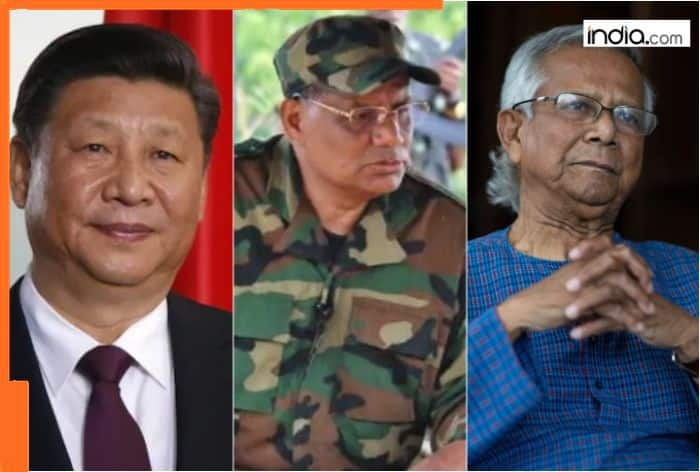
By clicking “Accept All Cookies”, you agree to the storing of cookies on your device to enhance site navigation, analyze site usage, and assist in our marketing efforts Cookies Policy.

India-Bangladesh relations: The Inter-Services Intelligence (ISI), Pakistan’s notorious spy agency, strengthened its presence in Bangladesh after the ouster of former Prime Minister Sheikh Hasina, and an interim government headed by Nobel laureate Muhammad Yunus coming to the helm in Dhaka in August last year.
Bangladesh has moved closer to New Delhi’s rivals, China and Pakistan, which has severely deteriorated India-Bangladesh relations, especially after widespread violence against Bangladesh’s Hindu minority by fundamentalists with the Yunus-led interim government not doing enough to stop this mayhem, and allegedly turning a blind eye to the atrocities perpetrated by radical Islamist elements.
Now, in other worrying development for New Delhi, China, Bangladesh, and ISI, have formed a sort of an ‘unholy trinity’, and are reportedly using notorious ULFA chief Paresh Baruah to ferment trouble in India’s Northeastern states.
According to a media report, Paresh Baruah, the leader of Assam’s militant organization ULFA (United Liberation Front of Assam), recently changed his hideout, allegedly with China’s help. Citing sources, a report by the Economic Times said that Baruah, who was earlier living in Ruili in China’s west Yunnan province on the Arunachal Pradesh-Myanmar border, has now been ‘relocated’ to the Xishuangbanna Dai Autonomous Prefecture in southwestern Yunnan.
Experts believe that the primary reason for Baruah’s relocation is the ongoing Myanmar civil war.
Its widely believed that Paresh Baruah has been used as a pawn against India by Pakistan’s ISI, China, and Bangladesh. In the 1990’s, after Indian Army launched a crackdown against ULFA, Baruah fled across the border to Bangladesh, where he was sheltered by the ISI and then-prime minister Khaleda Zia’s Bangladesh Nationalist Party regime.
During Khaleda Zia’s prominence in Bangladesh politics, Paresh Baruah remained in Bangladesh, and orchestrated extremist activities in the Northeast. However, after around 2006, when Zia’s grip weakened, Baruah felt that Dhaka could no longer protect him from New Delhi’s wrath, and he reportedly shifted his base to Ruili ahead of the 2008 assembly polls in Bangladesh, as it became clear that Sheikh Hasina would come to power.
In 2009, the Awami League government was formed in Bangladesh under the leadership of Sheikh Hasina, which remained in power till August 2024 when she was ousted and forced to flee the country.
Soon after Hasina’s fall, ISI remerged in Dhaka and expanded its presence even as former PM Khaleda Zia, who was jailed in a corruption case, was released as soon as the interim government came to power. Additionally, the Muhammad Yunus-led government also invited ISI officers to Bangladesh and hosted them in the sensitive area bordering India.
As per the ET report, China’s Xishuangbanna Dai region of China where Paresh Baruah is now living, is considered a stronghold of the Tai/Dai people, who share historical, cultural and ethnic ties with the Ahom people of Assam.
Additionally, reports suggest that Baruah may have access to the Mong La township, which is technically located in Myanmar but is under Chinese control. The Mong La region is home to National Democratic Alliance Army (NDAA, an insurgent group active in Myanmar’s eastern Shan State, which allegedly has ties with China.
According to experts, hundreds, if not thousands, of rebels from northeast India, including those belonging to ULFA, have sough refuge in the mountains north of Singkaling Hkamti in Myanmar’s Sagaing region.
The Myanmar Junta army, which is embroiled in ethnic rebellions in the country, has not paid much attention to these northeast Indian rebels, and Paresh Baruah may be used by China to once again recruit these former rebel fighters against India.
Paresh Baruah’s relocation Xishuangbanna is a major security concern for India as his location is close to the Indian border. Baruah could use this strategic location to ferment trouble in India’s northeast and try to garner support for the ULFA by taking advantage of the proximity of the Tai/Dai community in Xishuangbanna to the Ahom community of Assam.
As per analysts Bangladesh courts have also trying appease Pakistan and the ISI, by dropping graft cases and other serious charges against pro-Pakistan leaders like Khaleda Zia and other.
Earlier this week, Bangladesh’s Supreme Court upheld the decision of acquitting Khaleda Zia in a corruption case, after a lower court had handed her a 7-year prison term, which was later extended to 10 years by the High Court. Her son, Tariq Rahman, was also acquitted by the apex court.
Bangladesh also overturned Paresh Baruah’s death penalty into a life imprisonment, and later to a 14-year sentence.
In January, the Bangladesh High Court reduced the sentence of Paresh Baruah to 14 years in prison. The ULFA chief, who was based in Ruili at the time, was convicted in absentia in the infamous 2004 Chittagong arms smuggling case. Earlier, in December 2024, his death sentence had been changed to life imprisonment.
On April 1, 2004, as many as ten trucks laden with with weapons, including rockets and grenades, were seized by the Bangladeshi Police. It has been alleged that elements of the then Bangladesh Nationalist Party (BNP) government, with the help of ISI- Pakistan’s spy agency– had tried to smuggle the weapons using the jetty of Chittagong Urea Fertilizer Limited (CUFL).
Police said the massive cache of munitions were being shipped to separatists groups in India, especially, the United Liberation Front of Assam (ULFA). The seizure, later dubbed as the ’10-Truck Arms and Ammunition Haul in Chittagong’, is the biggest arms smuggling case in Bangladesh’s history.
According to a report by the Daily Star, a total of 4,930 types of sophisticated weapons, 27,020 grenades, 840 rocket launchers, 300 rockets, 2,000 grenade launching tubes, 6,392 magazines and 1,140,520 bullets were seized by the Bangladesh Police when these munitions were being loaded onto 10 truck from twin-engine boats at the CUFL jetty at the Chittagong port.
Paresh Baruah, the commander of ULFA, who was reportedly living in Dhaka at the time, is one of the 50 persons accused in the case.
For breaking news and live news updates, like us on Facebook or follow us on Twitter and Instagram. Read more on Latest World News on India.com.